The realities of doing a PhD
What’s it like doing a PhD in bioinformatics? Our students recently met at Nando’s, so we gave them a bunch of questions and let them discuss!
Thinking of doing a PhD in bioinformatics? Are you sure? What's it like? Read on to get a taste of PhD life through the experiences of our students, who also share some handy tips on what to do before and during your PhD adventure.
At Earlham Institute, we have an increasing cohort of PhD students testing their toes in the academic waters. For many, doing a PhD can be incredibly rewarding, but it’s hard work. Often, it forces you to move far out of your comfort zone to take on new information, build up new capabilities and practise the fine art of resilience (not to mention time and budget management).
So, what’s it like to do a (BBSRC NRP Doctoral Training Partnership) PhD at Earlham Institute, and what tips can our students share with someone thinking of starting out in the world of science. What options are they exploring once they finish their PhD?
It turns out that our PhD students all went to Nandos together recently, where I tasked Erin Baggs with quizzing them on their studies here at EI.

PhD related activities have given me skills to apply for jobs in communications or policy, although if all else fails I will go back to my dog grooming job offer.

*** Silence in Nando's ***
While the silence ensues, why don’t you read our articles on “10 things you need to know before starting a PhD” and “10 ways to ensure you write a good PhD thesis”.
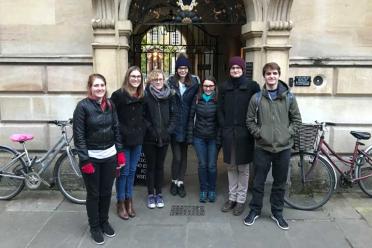
***A few minutes later***
Actually, our students agreed that there are indeed quite a few perks.
For a start, it’s possible to travel a lot while doing a PhD. Conferences might take you to an exotic new location (even if that means sitting in a dingy seminar room, staring longingly out of the window to the world beyond).
There’s also great diversity in the working day, littered with small victories, such as a python script working for the first time, that fabled first band on a gel meaning your PCR is working, or finding an interesting paper [If you’re lucky: Pete].
It’s not all work, either. The people you meet come from all sorts of places, making academia an incredibly diverse place to work. At EI we represent most of the continents, except currently Oceania and Antarctica, though we aid research in both of those regions on koalas and algae.
Rather nicely, everyone tended to agree that the goal of completing a PhD is something positive to strive towards, and it’s quite exhilarating to be researching a problem and uncovering something that no-one knew before.
Everyone tended to agree that interdisciplinary communication and communication with individuals who are very specialised in their field of work can be a challenge. Often, communication issues are underpinned by different logical approaches to the same problem which result in miscommunication when discussing projects over email in particular.
Hannah pointed out that another difficulty is there are no answers to check with and often very few complete experts in what you are doing, as by the very nature of a PhD you should be pushing the boundaries of current knowledge.
Erin also suggested that maintaining a work-life balance is important; “As I enjoy my PhD I often find myself working when I should be taking the time to relax or socialise.”
Finally, slow progress and self-doubt were mutually relevant sticking points. We’ve all been there!
Agatha says she’s more confident to apply to jobs, which we can all agree is pretty handy. A PhD can be a very useful qualification, even if you don’t plan on sticking around in academia for too long.
According to Marton, “my PhD has made me feel more independent and has given me the confidence to experiment in my approach to problems.” Another useful addition to any CV.
Erin has enjoyed “being exposed to various great talks which highlight the challenges in modern society this has made me all the more inspired to contribute to the issue of global food security.”
In an era of fake news and real lies, Hannah adds, “Question everything! It has made me critical of what I hear.” An important quality in a world of Donald Trump, Brexit and Geordie Shore.


My PhD has made me feel more independent and has given me the confidence to experiment in my approach to problems.

Like true scientists - our students did a vote to answer this question, with votes allowed for multiple options [and a graphical opportunity] (n = 9).
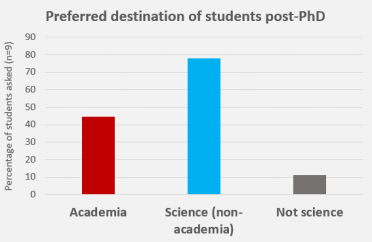
Good to see we didn’t put too many off.
It’s good to point out that there are many opportunities in science available to people with a PhD that don’t necessarily involve shouting at a computer, fighting for space on the cluster or getting repetitive strain injury while pipetting reagents into 96 well plates.
True to the value of a contingency plan, Ben says “PhD related activities have given me skills to apply for jobs in communications or policy, although if all else fails I will go back to my dog grooming job offer.”
Our students said “Eat, sleep, drink.” [Of course, Earlham Institute encourages responsible consumption of alcohol - though it does seem to nurse the wounds of a failed experiment from time to time.]
Other wholesome activities are available, too. Agatha likes to exercise and is part of an orchestra (she also comes to Dave’s crochet club on a Wednesday lunchtime). Erin practises mindfulness, Marton bakes bread and Emma goes windsurfing.
Ben thinks he is Robin Hood and dabbles at archery occasionally, though you’re more likely to find him searching for a Mew in the EI laboratory on Pokemon Go!
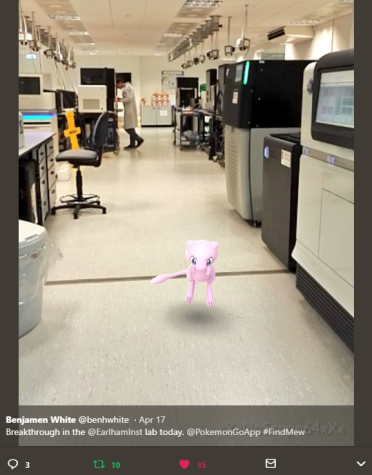
Everyone agrees - the taps are “next gen.” The coffee machine is amazing. Seriously though, it’s a really comfortable place to work with lots of natural light and friendly people.

Seriously though, it’s a really comfortable place to work with lots of natural light and friendly people.

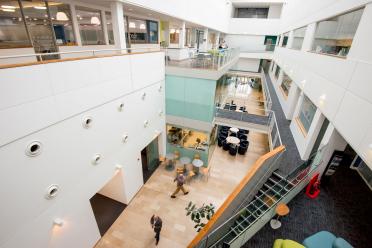
If you're interested in applying for a PhD, applications for our 2021 studentships with Earlham Institute are now open.
“Yams were mentioned nowhere in the ad,” said someone “anonymous” (but as there is only one person at EI who works on one of Africa’s favourite carbohydrates, which is NOT a sweet potato, we’ll leave you to work it out…)
Marton says he thinks it’s better than he expected, while Hannah and Erin pointed out that their PhD hasn’t changed much, they just weren’t expecting the sudden change of location! (Erin, we suspect, isn’t complaining about her move to California this summer).
As a group our students thought that “it is really nice to be a small institute on a large research park as you get to share facilities with all the others but have a strong sense of identity and that you can make a difference within the Institute.”
Hannah added that, “the services available due to the location on the park such as stores and horticulture are really impressive," while Erin pointed out that “collaboration with partner institutes is very easy and this can really advance research projects.”
Three cheers for collaboration! (And the “rec centre” bar with £1.50 beers. And heated swimming pool. And table tennis tables. And squash courts.)
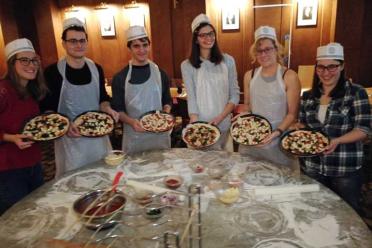
1. Notes, notes and more notes. At first it seems silly but after a week, a month or even four years when you come to write up it is nigh on impossible to remember what you did in the past.
2. Keep a track of outreach as this is part of your PhD but it is often difficult to remember all the things you have done as they often do not feel like work (but they are, we are publically funded and the general public deserves to be given the chance to understand your research).
3. “Read a paper a day” is common advice given to students, however we all agreed this is not achievable throughout a PhD so do not be hard on yourself about it.
4. Meet the team you are working with, it is most important to meet and communicate well with the person who will be supervising you day to day. Often this is not a group leader but a postdoc or senior PhD student. The day to day mentor you have is the person who often affects most how you feel about your PhD.
5. Make sure you have a support network beyond your supervisor, they do not necessarily need to understand your science.
6. No matter how much people tell you the things you can do to prepare yourself there is really no way to prepare except for getting started and stuck in, so don’t worry too much. Chill out before you start! [And during, and after.]
Try to get work experience in research, even better with the team you would like to join, even if it’s just a day it can be a good opportunity to work out what you like the most. [You might even realise that you can’t stand science after all and maybe you’d like to do something completely different - it has been known to happen!]
Talk to PhD students, often their email addresses can be found on the faculty website so get in touch with those in a group you would be interested in joining to ask about the atmosphere and their day-to-day work.
Make sure you understand what the work will involve and if you can see yourself running round a lab all day or sat at a desk only to make a dash for coffee when you want a break.

1. Elon Musk. (PS Teslas for poor PhD students are much appreciated )
2. Federica Di Palma. ‘Enthusiasm’ alone could combat the machines
3. David Attenborough. His narration of the end of the world would make it an epic biopic, also a cuddle from Attenborough would make anyone who was scared feel better
4. Craig Charles. From Robot wars. Can’t fully remember why we choose him but seemed a great suggestion at the time - he does play some funky tunes, which would be sure to bring some light hearted frivolity at the very least.
Our PhD students are funded by the BBSRC Norwich Research Park Biosciences Doctoral Training Partnership.